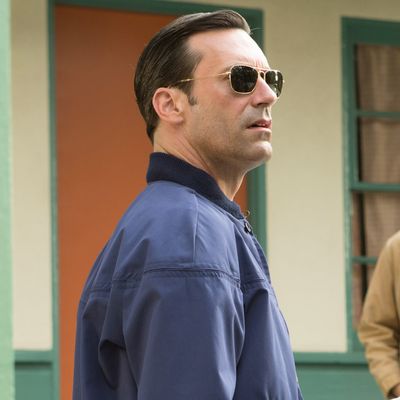
“We yearn to travel the way a child travels, round and around and back home again, to a place where we know we are loved.” Don told us — everyone — that in season one’s “The Wheel,” and it’s one of the rare pitches that stands out as not totally a lie. Don’t we all yearn to return to a place where we know we are loved? We’ve seen that teetering loop happen all season in Mad Men’s grand swan song: going back and redoing the things, reliving and reexperiencing our mistakes, our habits.
It’s the very theme of the show, particularly since Don doesn’t know where his “there” is. Last night’s episode found Don recontextualizing a formative chapter from his childhood, a chapter alluded to in the episode’s title. “The Milk and Honey Route” is the title of a “handbook for hobos,” a title the book takes from its own description of “any railroad running through a valley of plenty.”
But this is a transient term; what may be a milk and honey route to one hobo may not be so to another. A hobo may fare well on a route one time and another time fare ill. Again, it may be milk and honey for a road kid but not for an old timer.
Mad Men yearns to go round and round to season one’s “The Hobo Code,” but this time, one might fare well and one might fare ill.
In “The Hobo Code,” we encounter a young Don (“Ain’t you heard? I’m a whore child.”) and the philosophical hobo who asks the Whitmans for work. “We all wish we were from someplace else, believe me,” the hobo tells baby Don. “I’m a gentleman of the rails. For me, every day is brand-new.” That’s sad, says the little boy. You don’t have a home.
What’s at home? I had a family once: a wife, a job, a mortgage. I couldn’t sleep at night tied to all those things. Then death came to find me. So one morning, I freed myself with the clothes on my back. Good-bye. Now I sleep like a stone: sometimes under the stars, the rain, the roof of a barn. … Tomorrow I’ll be leaving this place, that’s for certain. If death was coming anyplace, it’s here, kid, creeping around every corner.
Death came for Don last night in his dream. “You knew we’d catch up with you eventually,” said the cop. Don woke with a jolt. Someone was in fact not sleeping like a stone. He’s freeing himself with the clothes on his back. In the flashbacks, young Don speaks in “improper” vernacular — “ain’t,” “you got no home,” and so on. He even mentions that the hobo doesn’t “talk like a bum.” In “Milk and Honey,” Don’s the one correcting grammar, insisting the aspiring grifter learn to code-switch, just as Don clearly has. It’s bad to leave your past completely behind, Don says, except what else is there. The hobo shows him the hobo glyphs, explaining what each symbol means: “That’s a pie; it means the food here is good.” Pete was the one eating pie last night, but the very first thing Don asked at the Sharon was where he could get something to eat. That means watch out for the nasty dog. Or maybe just the nasty bellhop whose bad behavior will definitely bite you in the ass. That means a dishonest man lives here. The kind who’ll hold your car hostage and let his friends hit you with a phone book. That means tell a sad story. Like maybe about what happened to you in Korea.
The whole episode was about the battle between old habits and new habits. Trudy wishes she could be sentimental, she says, but she remembers things how they were. Except, of course, not completely on either count. Won’t “they” fix your Coke machine, Don asks the motel owner. “They want to give me a new one. But I like this one,” he says. (This is an additional shout-out to season one, this time to season one’s “Shoot,” in which Betty models for a Coca-Cola ad for none other than Jim Hobart of McCann Erickson.) Betty’s faced a cancer scare before, only this time it’s different. She’s someone who has idolized her mother in the past, but this time wants to be different from her. (“She wanted me to be beautiful so I could find a man. But then what? Just sit and smoke? And let it go until you’re in a box?” That’s also from “Shoot.”) How many go-rounds will Pete have with Duck Phillips? Is dredging up old war stories harmful, or does telling the truth release you? How many times can you fix a typewriter, a car, a marriage, a lung, until it’s like new, and how many times until it just falls apart?

